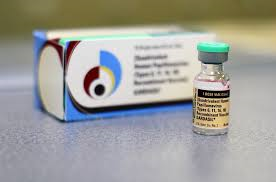
The U.S. Food and Drug Administration has approved a vaccine that protects against nine forms of human papilloma virus (HPV). HPV infection can lead to cervical, vaginal, vulvar, and anal cancer. Previous versions of HPV vaccines protected against only four form of the virus.
Gardisil 9 can prevent cancers caused by HPV types 16, 18, 31, 33, 45, 52 and 58 and can prevent genital warts caused by HPV types 6 and 11. It can also prevent precancerous lesions of the cervix, vulva, vagina, and anus caused by these forms of HPV. The five additional forms of the virus cause about 20% of cases of cervical cancer. Types 16 and 18 cause 70% of cases of cervical cancer. Gardisil 9 is made by Merck Sharp & Dohme.
HPV is the most common sexually transmitted infection. Most people who are infected do not know they are infected. Often, the body clears itself of the virus in a few years, but some types of HPV cause normal cells in the body to turn abnormal and can lead to cancer. Some forms of HPV cause genital warts, which appear as small bumps or irregular flat area. There are 40 different forms of HPV. The types of HPV that cause genital warts do not cause cancer.
HPV vaccines gives the best protection to people who receive all three vaccine doses and have time to develop an immune response before they become being sexually active. This is why the Centers for Disease Control and Prevention and the American Academy of Pediatrics recommend that the vaccine be given to boys and girls aged 11 or 12.
Gardisil 9 is given in three doses over the course of six months. Its safety was evaluated in 13,000 boys and girls. The most common adverse reaction was pain at the injection site, swelling, redness, and headache.
Another brand of HPV vaccine, Cervarix, made by GlaxoSmithKline, protects against HPV types 16 and 18 and is approved only for girls and women.



